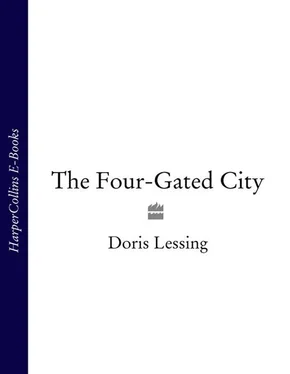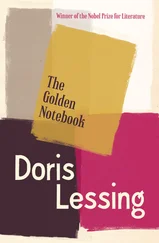She had left the street of prostitutes behind. She was getting towards Notting Hill. And now, although she had headed this way with an intention to loiter and look, to spend time until midnight when she might safely reach Jack’s, she had to brace herself before turning off the main road into an area which was worse than anything. The little streets across the river had never been other than small and thin and poor. The ‘West End’ was a market only, with what was full-fed and comfortable in it hidden from the pavements. The enormous piles along the Bayswater Road had been and would be again, a climate of money. But the streets, from here to the canal, were depressing and lowering: irredeemable by fantasy.
She waited for glimpses of a scene created by light out of the dark that pressed houses into the soil, houses that were cracked and leaning and dirty and wet, streets and streets and streets of them, and among them, the boarded-up spaces full of rubble or water-filled craters, or damp earth cleared for re-building. She was walking along a long low street with dark trees along it, and low pools of yellowish light at intervals, consciously bracing herself against depression, when she understood that in fact that part of her mind whose intimations she courted had spread, was swallowing the rest: she was on the verge of a sensation – no, wrong word, but what words were right? – a state then, that had been in fact the surprise of her being in London, its real gift to her. She had learned that if she walked long enough, slept slightly enough to be conscious of her dreams, ate at random, was struck by new experience throughout the day, then her whole self cleared, lightened, she became alive and light and aware.
Her practical self checked her physical condition: the meal in the restaurant was the first proper meal for days; the wine the first alcohol for weeks; she had scarcely slept last night, because of the noise from the café downstairs, which closed at midnight and started again at about five. And she had been walking and alert all day: the conditions were right, then. First, before the lit space, a terror: but slight, nothing that could overwhelm, less fear than the reluctance to acknowledge her condition of being so alien, of walking always as a watchful critic. This was loneliness? Yes, she supposed so. But, if so, what else had she ever known? So that was a gift too: people said ‘loneliness’ speaking of an ultimate dread; and she had once said ‘loneliness’ meaning a blow of fate that might make her alone among her fellow creatures: something that in the future might claim her.
But no, since she had been in London, she had been alone, and had learned that she had never been anything else in her life. Far from being an enemy, it was her friend. This was the best thing she had known, to walk down streets interminably, to walk through mornings and afternoons and evenings, alone, not knowing where she was unless she walked beside the river: sometimes walking so long she did not even know what part of London she was in, her feet tired, but conscious of strength in their tiredness, her head cool, watchful, alert, waiting for the coming of the visitor, silence. And her heart … well, that was the point, it was always her heart that first fought off the pain of not belonging anywhere, and then, resisted, told to be quiet, it quietened and stilled. Her heart as it were came to heel: and after that, the current of her ordinary thought switched off. Her body was a machine, reliable and safe for walking; her heart and daytime mind were quiet.
This then was what she had discovered, had been given, rather; and was so reluctant to give up. This was why she did not want to choose this slot or that, this or that job, this or that person, to become a tactful assistant to Henry and John Higham; or an addition to the people across the river. If only she could go on like this, walking for ever through the interminable, damp, hostile street of this doomed city, all cracked and thinned and darkened by war – if only she could stay here, in this area of herself she had found … her mind was swinging slowly from light to dark, dark to light. Into it came impressions: a tree, an intensely variegated mass of light; a brick wall picked out in a flood of glowing orange by a slant of light from a window; a face that looked out briefly from behind glass before a curtain twitched across. Her mind was a soft dark empty space. That was what she was. ‘Matty’ was an intolerably tedious personage she could think of only with exhausted nausea and fear that she might ever again be afflicted by her. Martha – well, ordinary Martha too had moved away, could be looked at: she did well enough, was not important. As for ‘Hesse’, it was a name acquired like a bracelet from a man who had it in his possession to be given to a woman in front of lawyers at the time of the signing of the marriage contract. But who then was she behind the banalities of the day? A young woman? No, nothing but a soft dark receptive intelligence, that was all. And if she tried – but not too hard, a quick flash of effort, a light probe into a possibility, she could move back in time, annulling time, for the moment of the effort, and stand in another country, on another soil. Walking down damp smelling pavements under the wet London sky in the summer of five years after the war, she was (but really became, as if nothing had intervened), Martha Quest, a young girl sitting under the tree from where she could see a great hot landscape and a sky full of birds and clouds. But really, not in imagination – there she sat. Or she was the Martha who had pushed a small child under leafy avenues with the smell of roses coming off town gardens. But really, there she was: she was, nothing to do with Martha, or any other name she might have had attached to her, nothing to do with what she looked like, how she had been shaped. And if she were able to go on walking, as she was now, day after day, night after night, down this street, up that, past houses, houses, houses, passing them always, with their shuttered and curtained eyes behind which a dull light hid, if she were able only to do that …
And now, into the quiet, came something she had forgotten – one always did forget. She had forgotten what could happen when the dark deepened and one thought it would remain, being so strong. It was as if behind the soft space was a maniac ready to dance inwards with idiotic words and phrases. Words and phrases and fragments of music were niggling at the back of her mind somewhere. But she had really forgotten that this idiot was there, who accompanied the gift of the quiet swinging dark, and whose words did not seem to mean anything. They came out of dark, floated for a while on the space and went on into dark. Then the words of songs and tunes – yes, of course, during the past few weeks she had become familiar with this phase, or stage. First, the quiet empty space, behind which stood an observing presence. Then, into the quiet space, behind it, an enemy, a jiggling fool or idiot. Humiliating! Absurd! Again and again she had won, with such difficulty, the quiet; and then encountered this silliness. She had resisted it. Again and again she had descended from the quiet because of this silly enemy. Tonight, she did not resist: she was too tired. And besides, she was remembering that she had made a discovery, found a new thought – rather a thought had floated in with the silly words and bits of music: that somewhere in one’s mind was a wave-length, a band where music jigged and niggled, with or without words: it was simply a question of tuning in and listening. And she had made the discovery, and then forgotten it, that the words, or tunes, were not all at random: they reflected a state or an emotion. Because the words of the songs, or the phrases, had a relevance: one could learn from them, if one did not shy off, indignant, annoyed, because of the banality, the silliness, the jumble of this band of sound just behind (beside?) the empty space. For, as Martha had told the wave-length, or the station, before tonight (and had forgotten that she had), you have a very poor sense of humour, you have no taste at all. For instance, a couple of weeks before, walking by the river, first achieving the quiet, then reaching or being afflicted by the band of sound, she had discovered that far from not caring about having no money, and reaching the end of what she had, she was worried, frightened in fact, because the tune that jigged there was ‘the best things in life are free’ over and over and over again, like a sardonic, squalling baby, grinding into her day-time consciousness that she must stop now, must look for work, must get back a condition of earning money. And because night after night she had reached this place, and been informed over and over again by this appallingly frivolous and silly voice that she was in fact scared stiff, she had taken the decision to put her life into responsibility, to leave the drifting and floating. So why resent the method if the information was of use? How did she want useful information to be given? In crashing chords no doubt, or with trumpets? That particular part of her brain did not work like that, and if she resented it, shied off, fled away, made a decision to descend, resisted, she also lost information she needed. The most interesting discoverings were made through banalities. Now, jiggling away there on the edge of the empty space was the announcement that she was tired and wanted to go home. True: but her feet had been telling her that loudly for more than an hour. It was not her feet, her body that were tired – but another part of herself: she understood that in fact she was under great strain: and in a flash of foreseeing, realized the plunge into inert exhaustion that would follow this height. But who, what, was tired, that she needed to be told she was?
Читать дальше












